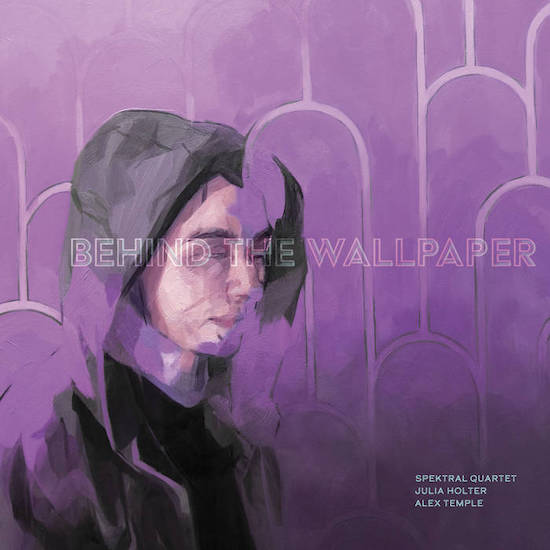Composer Alex Temple’s Behind the Wallpaper is a dreamlike but modern work about change. Inspired by her own transition, she has created a narrative tale that is as bizarre as it is beautiful and realised it through collaborators Spektral Quartet and Julia Holter.
With the exception of a few found sounds and odd percussive details, Chicago string quartet Spektral Quartet provides the only instrumentation on the album. Behind the Wallpaper doesn’t follow set song structures, and the quartet’s contributions take on multi-dimensional characters in the work, from shuddering rhythms to playful pizzicatos to sharp, slicing dissonance. It is equal parts cinematic, romantic and terrifying, and essential to the world building around Temple’s story.
For as dense and vibrant as Spektral Quartet’s instrumentation can be, Behind the Wallpaper is not afraid to peel it all back and embrace minimalism, allowing for Holter’s voice to be accompanied by a single string instrument, for her to sing unaccompanied, and for soft, staticky silence to stretch out for seconds.
As an artist who has collaborated across many and varied genres, Holter is a perfect vocalist for the project. Her vocals are distinctive, instantly recognisable, and yet, as a convincing nod to the fact that she’s lending her voice to someone else’s story, more measured in their phrasing and inflections than she would be on her own work. Holter takes on the role of a narrator, relating the story of a ‘you’ main character, inviting the listener to envision their place in the vividly strange story. Even the winking outro of ‘Unnatural’ follows this course: ‘And you thought, “You make me feel like an unnatural woman.”’
The lyrics shift throughout the album from the surreal (whole fish pouring out of your mouth and the ocean flooding your living room) to the tangibly mundane (the people riding along on a bus). ‘Joline’, the album’s meandering standout, sets a scene of a fantasy horror film, featuring a mystical forest and a house producing new walls and exacting violence on its visitors. The song propels through different movements, tumbling from creaking wood to jaunty rhythms to a see-sawing dissonance. Reaching the end of the song feels like coming through the other side of something, but the emotion of having done so is more conflicted than concrete.
Behind the Wallpaper has the feeling of metamorphosis around it – something new and beautiful that emerges from a painful process. It is not to minimise Temple’s personal story to suggest that the theme will resonate broadly; the lyrics are abstract but will feel familiar to anyone who has made a difficult change in their lives. Indeed, it’s a suitable soundtrack for being unmoored.


